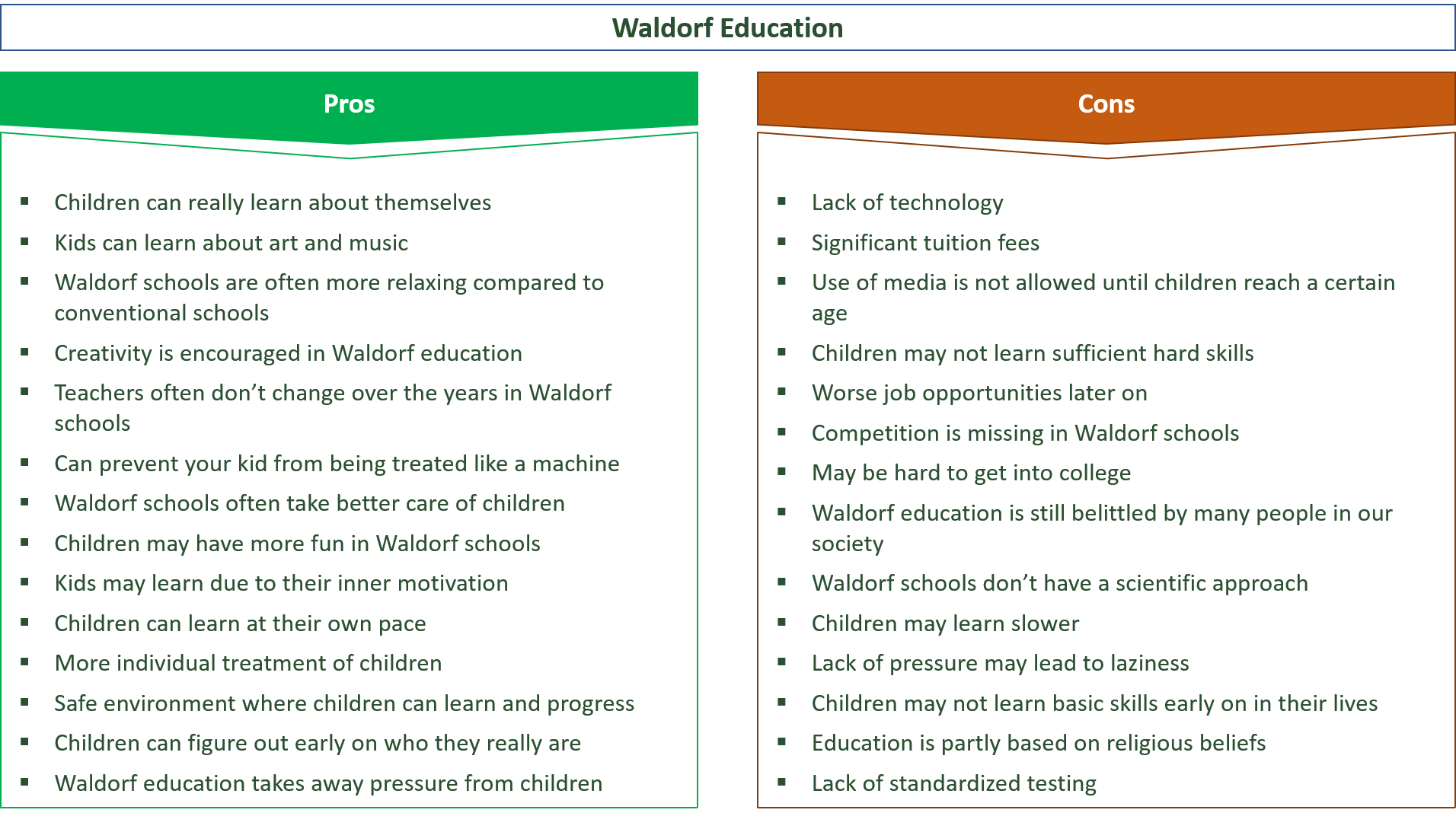“The roots of education are bitter, but the fruit is sweet.”
Aristotle, Philosopher
Advantages & Disadvantages of Waldorf Education

Waldorf education (sometimes also referred to as Steiner education) has become increasingly popular over the past decade.
Many parents search for an alternative way to educate their children.
While conventional education rather focuses on the development of standardized skills, Waldorf schools take a more holistic approach and try to give kids more opportunities to develop their own character and to connect to their spirituality.
Although there are many advantages of Waldorf Schools, there are also some problems related to this concept.
In this article, the pros and cons of Waldorf Education are discussed.
Audio Lesson
Contents
Advantages of Waldorf Education
- Children can really learn about themselves
- Kids can learn about art and music
- Waldorf schools are often more relaxing compared to conventional schools
- Creativity is encouraged in Waldorf education
- Teachers often don’t change over the years in Waldorf schools
- Can prevent your kid from being treated like a machine
- Waldorf schools often take better care of children
- Children may have more fun in Waldorf schools
- Kids may learn due to their inner motivation
- Children can learn at their own pace
- More individual treatment of children
- Safe environment where children can learn and progress
- Children can figure out early on who they really are
- Waldorf education takes away pressure from children
Children can really learn about themselves
One important advantage of Waldorf education is that children can really learn about themselves.
While children in conventional schools will often have a strict curriculum and teachers don’t deviate from that too often, children in Waldorf schools can try out many different things.
In general, if kids are able to try many new things, they will be much better able to figure out what they really like, what they are good at and so on.
In turn, teachers in Waldorf schools can focus on those talents and can support these kids in their development process instead of just using the same curriculum for every child as in conventional schools, independent of what children are really good at and interested in.
Kids can learn about art and music
Rather unscientific fields like music and art are often neglected or even fully excluded from the curriculum of conventional schools.
However, in Waldorf education, those fields play a major role and children are actively encouraged to paint or to play an instrument.
This can be quite beneficial for kids since they will also be able to explore their artistic nature instead of just focusing on a scientific and rational approach towards learning.
Waldorf schools are often more relaxing compared to conventional schools
Another upside of Waldorf education is that children are often far more relaxed in Waldorf schools compared to conventional learning institutions.
This is due to the fact that teachers in Waldorf schools don’t put too much pressure on kids.
Instead, kids should explore for themselves what they want to do and how they want to learn things.
Hence, since the overall stress levels of kids will be significantly lower due to these alternative teaching methods, also the risk for mental issues for children will be lower.
Creativity is encouraged in Waldorf education
Creativity is often greatly neglected in normal schools. In fact, while children are taught math, writing and some other hard skills, the creative side of human nature is not addressed in a sufficient manner.
In contrast, through Waldorf education, children will get the opportunity to explore their creative side.
This includes painting pictures, playing music, singing and several other tasks that focus on encouraging the creative side of kids.
Teachers often don’t change over the years in Waldorf schools
Another benefit of Waldorf schools is that teachers usually don’t change over the years.
In fact, while teachers in conventional schools often change after the school year has been finished, teachers in Waldorf schools will educate children for many years.
This allows teachers to build a much closer connection to school kids and those children will also trust their teacher much more.
In turn, chances are that children in Waldorf schools will also have a higher motivation to learn and can also contact their teacher in case they face problems at home.
Can prevent your kid from being treated like a machine
In general, in our current state of the world, children are often treated like machines instead of free human beings.
When you take a look at our education system, you will soon realize that every step a kid has to take in conventional education aims to improve his or her productivity.
In fact, children are raised like machines in our nowadays age.
Once they turn into grownups, they should serve the general public by working in an office job for long hours every day without ever questioning the perverse nature of the game.
In my opinion, this sort of education doesn’t serve humanity and our children too much and we should treat our children like humans instead of just dumb machines.
This also implies that we should give our children a certain level of freedom in their childhood so that they can figure out what they are really interested in and what they are good at.
Not everyone is made for college and there are plenty of alternative career paths that would be far more suited for many children.
Waldorf schools often take better care of children
Teachers in Waldorf schools often also take quite good care of children.
This is due to the fact that those teachers often really love their job and really believe in the concept of Waldorf education.
In turn, those teachers are often much more motivated to provide the best experience possible for the children they educate.
In contrast, in many conventional schools, teachers lose all their motivation after just a few years and are just looking forward to the weekend every day.
Hence, if you want motivated teachers for your kids, you may want to go for Waldorf education instead of sending your kids to normal schools.
Children may have more fun in Waldorf schools
Since children will have a higher level of freedom regarding what and how they want to learn, they will often also be much more motivated to learn and to try new things. In turn, many children really like to go to Waldorf schools.
In fact, some children cannot wait until the weekend will be over and they will be able to go back to school.
Hence, Waldorf education can also increase the overall level of motivation for kids.
Kids may learn due to their inner motivation
In fact, children in Waldorf schools often develop an inner motivation to learn and to progress.
They are not conditioned on getting good grades too much. Instead, they are encouraged to really figure out their strengths.
In turn, those kids will often become quite confident since they learn a positive attitude towards life from an early age on and their inner motivation to go out and explore the world will often be much higher compared to children from conventional schools who are often afraid of failure.
Children can learn at their own pace
Another advantage of sending your kid to Waldorf school is that your child can learn at his or her own pace.
Children are quite different and while some children have natural talents in a certain area, they will often lack talent in other areas.
Hence, it is crucial that children can learn at their own pace since they will often need more time to understand certain topics.
However, in conventional schools, there will often be a strict timetable and children will be forced to learn at a given pace instead of giving them the freedom to learn at their own pace like in Waldorf schools.
More individual treatment of children
In general, children will also benefit from more individual treatment in Waldorf schools compared to conventional schools.
Since teachers in Waldorf schools give children the opportunity to try many new things, teachers will also figure out quite soon where kids have strengths and weaknesses.
In turn, they will be much better able to assist those children and to provide them with a more individualized learning experience.
By doing so, children will get the opportunity to get a comprehensive and holistic learning experience through Waldorf education, which is often missing in conventional schools.
Safe environment where children can learn and progress
Children also need a safe environment where they can learn, progress and develop new skills.
Only if children feel protected and feel like they can do nothing wrong, they will find the courage to try out new things and to really develop their own character.
Thus, the safe environment that Waldorf education provides can be regarded as a cornerstone for the individual development of children.
Children can figure out early on who they really are
In general, since children will have a much higher level of freedom regarding what they want to do in Waldorf schools, they will also be much more likely to figure out what they really want to do in the future.
It is quite sad, but many people in our nowadays society feel lost and don’t have a purpose in life.
This is often due to the fact that people don’t learn from an early age on to go their own path in life instead of just focusing on the mainstream narrative.
Consequently, if you want to provide your children with the opportunity to figure out what they really want to do with their lives, sending them to Waldorf school instead of conventional education facilities may also be the way to go for you.
Waldorf education takes away pressure from children
Since Waldorf schools don’t focus on grades too much, children will often also feel much more relaxed compared to children in conventional schools.
In fact, teachers and parents often apply significant levels of pressure on their kids to get good grades.
However, those high levels of pressure may lead to serious mental issues for kids over time.
Therefore, if you want to take away pressure from your kid, sending your child to Waldorf school may be the right way to go for you.

Disadvantages of Waldorf Schools
- Lack of technology
- Significant tuition fees
- Use of media is not allowed until children reach a certain age
- Children may not learn sufficient hard skills
- Worse job opportunities later on
- Competition is missing in Waldorf schools
- May be hard to get into college
- Waldorf education is still belittled by many people in our society
- Waldorf schools don’t have a scientific approach
- Children may learn slower
- Lack of pressure may lead to laziness
- Children may not learn basic skills early on in their lives
- Education is partly based on religious beliefs
- Lack of standardized testing
- Waldorf education may be an outdated concept
- Parents also have to contribute their part in Waldorf schools
- Children may get a flawed perception of life
- Vaccinations are often not accepted in Waldorf schools
Lack of technology
Although Waldorf education can have many important benefits, it can also imply serious issues.
For example, one problem of Waldorf education is that Waldorf schools are often not equipped with proper technology.
In turn, this also implies that modern teaching methods that rely on this sort of technology cannot be used and especially in our nowadays technologized age, this can really be a problem since processes cannot be optimized and will continue to be rather inefficient.
Significant tuition fees
Another downside of Waldorf education is that those schools often have quite high tuition fees.
Hence, many children from poor families will not be able to afford to go to Waldorf schools and those schools may only be frequented by children from rather wealthy families.
In turn, this may lead to a lack of cultural diversity in those schools.
Use of media is not allowed until children reach a certain age
Not only teachers will often refrain from using new technologies in Waldorf schools, also children will not be allowed to use any sort of technology until they reach a certain age.
However, this can be quite bad for kids since they will not learn how to deal with technology from an early age and may have difficulties with learning those skills at an older age.
In our current state of the world, it is crucial that children learn digital skills as soon as possible since they will likely not be able to compete on the job market later on without this sort of digital knowledge.
Hence, Waldorf education may also lead to serious problems later on when children turn into grownups and have to prove themselves in the fierce global competition.
Children may not learn sufficient hard skills
In general, since Waldorf schools focus on creativity rather than on hard skills, children in Waldorf schools may not learn sufficient hard skills.
In turn, they may experience serious problems later on in their lives.
While creativity is important, it is also important to become good at math and if you don’t have sufficient math skills, chances are that you will suffer from serious issues in various parts of your life.
Therefore, the lack of hard skills children will often have when they attend Waldorf schools can turn into a real problem for various different reasons.
Worse job opportunities later on
Another downside of Waldorf education is that it might lead to worse job opportunities for kids.
In fact, many companies are still rather skeptical towards the Waldorf education approach and may therefore reject job applications.
Moreover, since children from Waldorf schools often lack a certain level of hard skills, chances are that employment opportunities will also be worse due to that.
Therefore, be aware of the fact that Waldorf education may not prepare your kid too much for a demanding corporate career.
Competition is missing in Waldorf schools
While the lack of competition can take away the pressure from children in Waldorf schools, it can also lead to a state where children get a flawed perspective on reality.
In fact, life is one big competition and if children don’t learn this from an early age, they will be much more likely to suffer from a certain shock when they finally realize that the world is not that nice place that they had been taught it was.
May be hard to get into college
Children from Waldorf schools may also have a harder time getting into college since they often lack certain skills and qualifications that would be required to get into those higher education institutions.
Thus, make sure that you check out the requirements of colleges in your area before you send your kid to Waldorf school in order not to take away the opportunity to send your kid to college if he or she wants to go there.
Waldorf education is still belittled by many people in our society
While Waldorf schools have become increasingly popular over the past decades, they are still belittled by many people in our society right now.
In fact, many people think that Waldorf education is not healthy for a child and that it doesn’t prepare children enough for what will be waiting for them once they turn into grownups and have to stand on their own feet.
Therefore, children from Waldorf schools may also be bullied by other children since the social acceptance is still missing in many regions of our planet.
Waldorf schools don’t have a scientific approach
Another disadvantage of Waldorf education is that those schools often don’t have a scientific approach towards teaching.
They rather focus on improving the level of creativity of children.
However, scientific education is often missing and this may not be beneficial for children since scientific findings are crucial to make the world a better place.
Children may learn slower
Children in Waldorf schools often learn much slower compared to children from conventional schools.
This is due to the fact that teachers in Waldorf schools often apply less pressure on kids to learn. Instead, they let the kids learn at their own pace.
However, due to this lack of pressure, children will often not have sufficient motivation to study hard and may not achieve the same knowledge as kids who go to conventional schools.
Lack of pressure may lead to laziness
In fact, opponents of Waldorf education also often claim that the lack of pressure in Waldorf schools may also make children lazy and unmotivated.
Children may not have a clear goal and may therefore just spend their day sitting around and doing what they want.
In turn, they may not achieve the education level that is needed to succeed in our current state of the world.
Children may not learn basic skills early on in their lives
Another problem with Waldorf schools is that children will often not learn sufficient basic skills early on in their lives.
Most people agree that a certain level of math, writing and reading skills are crucial to succeed in various parts of life.
In turn, if children don’t learn these important skills early on, they will be more likely to have problems functioning in our society.
Education is partly based on religious beliefs
Waldorf education is also based on a set of religious beliefs.
Hence, parents who are rather skeptical about religion may also not want to send their kids to Waldorf school since they fear that children will learn plenty of religious beliefs.
Lack of standardized testing
Many parents are also rather skeptical about Waldorf schools due to the fact that Waldorf schools often do not use standardized testing for evaluating the skill levels of kids.
In turn, it will be hard to assess the true skillsets of children and it will also be hard to improve skills of children that are currently rather poor in an objective manner.
Waldorf education may be an outdated concept
Many people also claim that Waldorf education is a rather outdated concept that is no longer suitable for our highly technologized state of the world.
In fact, many people think that the lack of technology in Waldorf schools will lead to serious problems for children later on in their lives since technological knowledge will be a main factor for success in the future.
Hence, many parents are also afraid that Waldorf education will not provide their children with the skillset that will be needed to succeed in life in the near future.
Parents also have to contribute their part in Waldorf schools
While conventional schools often don’t require parents to actively participate in the daily school routine, Waldorf schools require parents to contribute their part and to bring in new ideas in order to improve the overall learning experience of children.
Therefore, if you don’t have time for this kind of work since you work in a demanding job for long hours every day, chances are that sending your kid to Waldorf school may not be the way to go for you.
Children may get a flawed perception of life
Since Waldorf schools aim to take away the pressure on children and provide them with a peaceful and calm learning environment, children who go to Waldorf school may also get a flawed perception of reality.
In fact, the world is not a safe place and if children don’t learn how to compete and how to solve problems in an efficient manner, they may not be able to perform in real life since school simply not prepared them for the fierce level of competition that is waiting for them once they turn into grownups.
Vaccinations are often not accepted in Waldorf schools
Opponents of Waldorf education also often claim that those schools are not safe for children since
Waldorf education does not promote vaccinations and therefore, diseases may spread in Waldorf schools more easily.
Thus, also from a health perspective, Waldorf schools may not be the way to go if you want to protect your children from those health risks.

Top 10 Waldorf Education Pros & Cons – Summary List
| Waldorf Education Pros | Waldorf Education Cons |
|---|---|
| Waldorf education can help children learn | Waldorf education can be costly |
| Can give children a different perspective | May give kids a flawed perspective |
| Waldorf education can improve creativity | Kids may not learn how to compete |
| Children learn about music and art | Still belittled in many countries |
| Kids learn in what they are good at | Lack of standardized testing is a problem |
| Alternative to machine-like education | Based on religious beliefs |
| More individual treatment of children | Kids may not learn important digital skills |
| Takes away pressure from kids | Lack of preparation for the job market |
| Waldorf education can help to overcome fears | Kids may not learn sufficient hard skills |
| Kids can learn at their own pace | Lack of vaccinations is a problem |
Should You Send Your Kid To Waldorf School?
As we have seen before, there are many advantages and disadvantages of Waldorf education.
In the end, you should evaluate all the pros and cons of Waldorf schools carefully in order to make the best decision for your kid.
You may also want to ask other parents regarding what experiences they made with Waldorf schools so that you can better evaluate whether you want to send your kid to Waldorf school or not.
Sources
https://en.wikipedia.org/wiki/Waldorf_education
https://www.waldorfeducation.org/waldorf-education
https://www.nytimes.com/2020/04/19/parenting/waldorf-school.html

About the author
My name is Andreas and my mission is to educate people of all ages about our environmental problems and how everyone can make a contribution to mitigate these issues.
As I went to university and got my Master’s degree in Economics, I did plenty of research in the field of Development Economics.
After finishing university, I traveled around the world. From this time on, I wanted to make a contribution to ensure a livable future for the next generations in every part of our beautiful planet.
Wanna make a contribution to save our environment? Share it!
